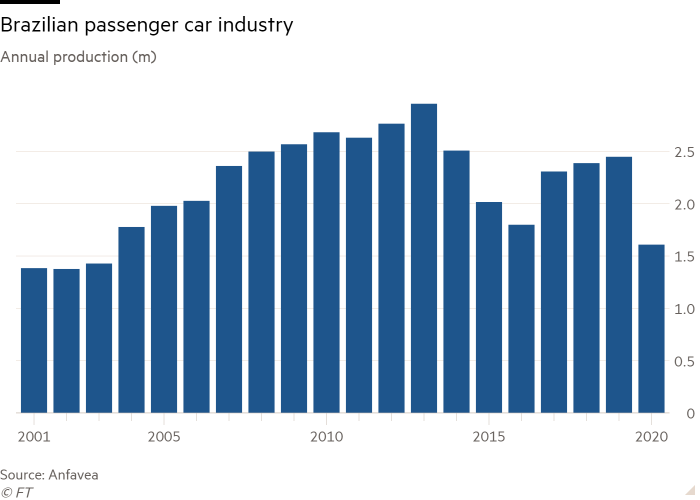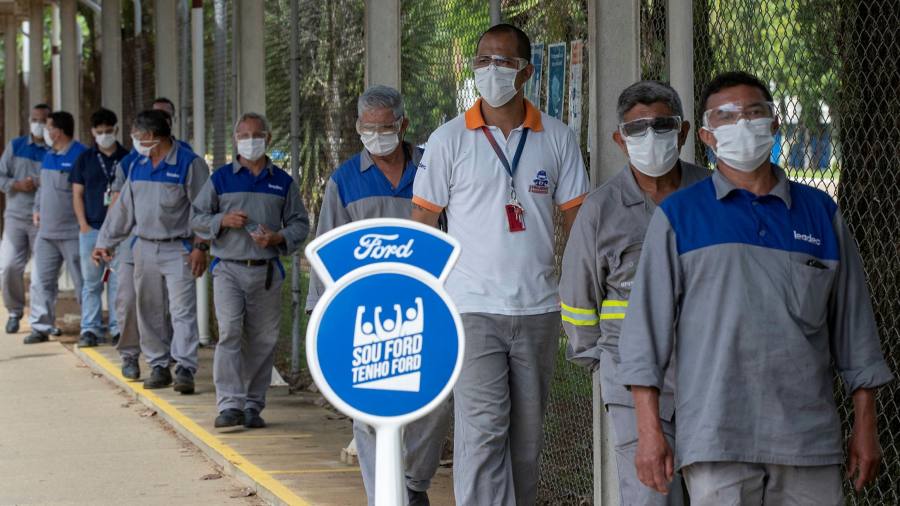[ad_1]
Rui Costa could not hide his exasperation when Ford announced it was shutting its manufacturing in Brazil, including in his native Bahia, where thousands of people rely on the US carmaker for work.
“Brazil is intent to become a big farm,†said the governor of the vast state on the north-eastern seaboard. “What have we planned in the last five years to increase investment in technology and industrialisation? Nothing.â€
Mr Costa’s comments reflect a deep-seated concern permeating Brazil’s car industry, reeling from the shock exit of Ford in January after more than a century of manufacturing in the country.
Lacking proper investment and plagued by weak sales and cumbersome bureaucratic costs, carmaking in Brazil looks increasingly untenable.
Car executives try to paint a rosy picture, pointing to the vast potential of Brazil’s market, the array of new products on offer and even silver linings to the coronavirus pandemic, which has pushed more people towards private transport.
But for many independent observers, structural factors mean — barring a rapid economic turnround in Latin America’s largest economy — the writing is on the wall, particularly as the administration of Jair Bolsonaro begins unwinding longstanding subsidies worth billions of dollars.

“There is a point where you pile up all the constraints, all the regulations, the headwinds, you end up with a situation that is not manageable any more. Either countries and regions want an automotive industry, or they don’t,†said Carlos Tavares, chief executive of Stellantis, the newly merged Fiat Chrysler and PSA. He added that Ford’s withdrawal was “a warning light†to the Brazilian government.
João Henrique Oliveira, an executive with Volvo in Brazil and the president of an association for car importers, put it more starkly: “[The exit of Ford] really shows that the business environment in Brazil is very difficult, even hostile. We could see other brands taking the same decision.â€
With no homegrown manufacturers, Brazil’s carmaking has for decades been dominated by western and Japanese companies. In recent years, Chinese manufacturers have made inroads and many suspect groups such as Chery might make a bid for Ford’s facilities.
The sector, however, has not fully recovered from a swingeing recession in 2015 and 2016, hampered by high unemployment and a weak exchange rate that has made imported parts exorbitantly expensive.
“Brands in Brazil are under very strong financial pressure. Factories in Brazil are running at 50 per cent of their installed capacity, which is very poor,†said Mr Oliveira.
Ford’s exit follows other cutbacks. Mercedes said in December it would close a production facility, while Volkswagen last year laid off 1,300 employees in São Paulo.
The flagging performance of Latin America’s largest market comes at a time of broader global restructuring. As carmakers focus on Asia and the shift towards electric and autonomous vehicles, some analysts believe Brazil will be left behind.
“The global restructuring plays a much larger factor [in threatening Brazil’s car industry],†said André Roncaglia, an economics professor and motor expert at the Federal University of São Paulo. “With the move to electric and self-driving cars, all attention is on Asia and this puts Brazil in a vulnerable position.
“We don’t have the ability to catch up to this movement and, as a system, I don’t think we are ready to even move in that direction without profound changes in the current support schemes offered to the industry.â€
But the country also has to contend with longstanding domestic problems, particularly the Custo Brasil — the extra cost involved with doing business in a historically cloistered economy plagued by cumbersome bureaucracy, logistics and tax rules.
“The Custo Brasil always makes business a delicate equation,†said Mr Oliveira, pointing out that Volvo employs four times as many people to deal with the country’s labyrinthine tax rules as it does in Europe.
“It’s a [tax] system that generates controversies and legal insecurity. However much you’re aware that you’re trying to do it in the most correct way, you are still subject to questioning and risks.â€
Since his election, Mr Bolsonaro has pledged to overhaul the tax system, but has little to show for it. The government has, however, moved to cut back car subsidies, which critics say propped up uncompetitive companies with no benefit in lower prices for consumers.
When Ford announced its exit, Brazil’s president accused the US company of only “wanting subsidiesâ€.
Leticia Costa, an auto consultant with investment group Prada Assessoria, said carmaking was an industry with the “potential to bring great economic and innovation gains to Brazil. But it received benefits that were on balance poorly designed.â€
The outlook for carmaking in the country, however, is not completely bleak.
Executives say they are “cautiously optimistic†about the year ahead. They see the market being boosted by “compelling products†as well as Brazil’s historically low interest rates, which companies say encourage consumers to buy cars rather than save.
“The recovery last year was faster than we expected and in the last quarter the sales result were similar to 2019. We expect sales to keep recovering this year,†said an executive with General Motors, whose Onix subcompact car has been Brazil’s top seller for the past six years.
The company is rolling out a $2bn investment in São Paulo, with a focus on new products and technologies for safety and connectivity.
Volkswagen has also struck a bullish note, with its Latin America boss telling local media the company expected between 10 and 12 per cent growth in Brazil this year.
Mr Tavares said that Fiat Chrysler had also been “doing a stellar job in Latin Americaâ€, with healthy profits. But he warned that Brazil remained fragile. “We cannot keep on adding constraints. There will come a time where it is not manageable any more.â€
Additional reporting by Carolina Pulice
[ad_2]
Source link






